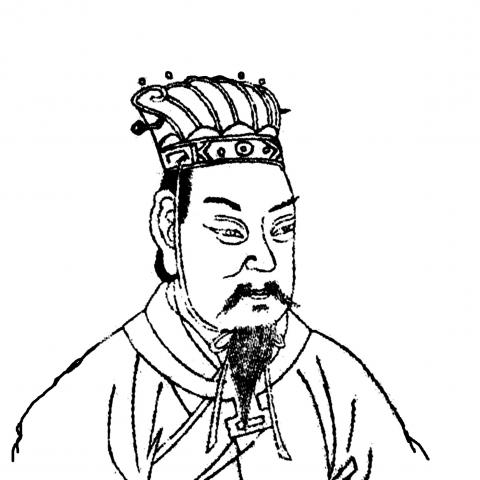Chinese Practice
說曹操曹操到
(shuo1 cao2 cao1 cao2 cao1 dao4)

Photo: Wikimedia Commons
照片:維基共享資源
say his name, and Cao Cao will appear
片語「speak of the devil」,或者其較符合歷史的說法「talk of the devil」,實際上是用來警告別發生所說到的事。這是一句古諺語「talk of the devil and he doth appear」(說到魔鬼它就出現了)的前半部,而你並非真的希望魔鬼出現。跟許多諺語一樣,我們通常只說出前半段,後半段的意思就如同歇後語一樣是用暗示的。
現今這句話的用法較輕鬆詼諧,是說若提到某人或某事,他(它)就會忽然出現,但其實它原本的意義並非輕鬆詼諧的。這個不准提到魔鬼的禁忌,也造成了各式各樣其他代稱,例如「黑暗王子」、「老尼克」,或「那個長角的」。
此句以現代英語首次見諸印刷文字,是在喬凡尼‧托利安諾所著之《世界廣場》
(西元一六六六年出版),書中提到,「英人常言,說到魔鬼,魔鬼就會在你手肘邊出現。」
中文俗語「說曹操曹操到」,形容才剛說到某人,某人就出現了。此語之典故咸認出自《三國演義》中的故事。《三國演義》第十四回描述漢獻帝在與叛軍交戰時陷入被圍困的險境,有大臣向漢獻帝推薦請曹操前來救駕。但尚未傳訊給曹操,曹操便已派兵前來解救皇上,最後順利脫困。三國演義將曹操描繪成一代奸雄、工於算計,因而處處佈下眼線,任何動靜都逃不過曹操耳目,所以曹操可能隨時在關鍵時刻出現。
但是「說曹操曹操到」一句並非出自《三國演義》,而是出自晚清曾樸所著譴責小說《孽海花》第二十九回其中一句對話:「無巧不成書!說到曹操,曹操就到。」
(台北時報編譯林俐凱譯)
說曹操曹操到,兒子啊,你看看誰來我們家了?
(Speak his name, and Cao Cao will appear. Look who’s come to visit us.)
我們還正猜想你今天到底會不會來練球呢!說曹操曹操到,你可出現了!
(We were just wondering whether you would come today to practice, and then you turn up.)
英文練習
speak/ talk of the devil
[and the devil doth come]
The phrase “speak of the devil” or, more historically, “talk of the devil,” is actually an admonishment to do just the opposite. It is the first half of an old proverb whose original form was “talk of the devil and he doth appear,” and you really don’t want the devil to appear. As is the case with many proverbs, it is customary to just say the first half, the rest of the phrase being implied.
Nowadays, it is more likely to be used in a lighthearted manner, commenting on the sudden appearance of a person or thing when their name is mentioned. It was not originally used in this lighthearted way, however. The taboo of mentioning the name of the devil probably contributed to the wealth of alternative ways in which to refer to him, such as the “Prince of Darkness,” “Old Nick,” or “the Horned One.”
The first known printed use of the phrase in modern English is in Giovanni Torriano’s Piazza Universale (1666), which tells us, “The English say, Talk of the Devil, and he’s presently at your elbow.”
In Chinese, there is the phrase “speak his name, and Cao Cao will appear,” describing the idea that if you say someone’s name, that person will materialize. The origin of the phrase is acknowledged as being from a story in the Romance of the Three Kingdoms. The 14th chapter of the book relates how Emperor Xian of Han found himself surrounded during a battle with the rebel army, and one of his ministers advised that he call for the warlord Cao Cao to come to his aid. It turns out that Cao Cao had already dispatched a force to save the emperor, even without word having been sent, and in the end Emperor Xian was able to escape. The book portrays Cao Cao as an ambitious schemer, who had eyes everywhere: nothing could escape his notice. It was for this reason that he was able to appear anywhere his presence was needed, and just in the nick of time.
The actual phrase was not found in the Romance, however: it comes from the “novel of denunciation” Flower in a Sea of Sin written in the late Qing by Zeng Pu. In Chapter 29 there appears the phrase, 「無巧不成書!說到曹操,曹操就到」, meaning “What a curious coincidence. Speak his name, and Cao Cao appears.”
(Paul Cooper, Taipei Times)
Where did you just come from? We were just talking about you. Speak of the devil...
(你是從哪裡冒出來的?我們才剛說到你。說曹操曹操到。)
Let’s not talk about Mr Jones here, he might walk by. You know what it’s like: talk of the devil...
(我們還是不要在這兒討論鍾斯先生的事,搞不好他會從這裡經過。你知道不該發生的巧合反而最有可能發生。)

A: After attending Taiwanese baseball superstar Chen Wei-yin’s retirement ceremony in Japan, why didn’t you stay longer for some fun? B: Don’t you remember? We’re going to Blackpink member Jisoo’s fan meeting at Messe Taoyuan this Sunday. A: Oh, that’s right. She’s the second Blackpink member visiting Taiwan as a solo artist after Lisa. B: Jisoo just released her EP “Amortage” on Valentine’s Day. A: Blackpink will also release new songs and launch a world tour this summer. A: 你去日本參加台灣強投陳偉殷的引退儀式後,怎麼沒留下來玩幾天? B: 你忘啦?我們週日還要去「桃園會展中心」參加Blackpink成員Jisoo的見面會。 A: 啊對耶,她是繼Lisa後第二位單飛訪台的Blackpink成員。 B: Jisoo不久前才在情人節,推出個人迷你專輯《Amortage》。 A: Blackpink今年夏天也會推出新歌,還會啟動世界巡演呢! (By Eddy Chang, Taipei Times/台北時報張迪)

A: Taiwan’s baseball superstar Chen Wei-yin announced his retirement, and I’m still in shock. B: Didn’t you fly to Japan last Sunday just to attend his retirement ceremony? A: Yeah, it was held by Chen’s former Japanese team, the Chunichi Dragons. I even cried at the event. B: His glorious record of 96 wins in Japanese and US professional baseball altogether is unprecedented. A: His total income of NT$3.3 billion, including a huge 2016 contract of US$80 million with the US Miami Marlins, is also unprecedented. A: 台灣棒球巨星陳偉殷宣布引退,真是令人震驚。 B: 你週日不是特別飛去日本,參加他的引退儀式嗎? A: 對啊老東家「中日龍」為他舉行了儀式,我還感動到大哭。 B: 他創下日/美職棒總計96勝紀錄,真是史無前例。 A: 而他生涯總收入高達33億台幣,包括在2016年時,和「馬林魚」簽下8千萬美元巨約,更是無人能及! (By Eddy

In another application of artificial intelligence, a team of archaeologists from the Nazca Institute at the University of Yamagata in Japan, in collaboration with IBM Research, have discovered 303 new geoglyphs in the “Nazca” region of Peru. Though these figures are not nearly as large as their Nazca Lines counterparts, their discovery has helped enhance the understanding of the transition from the Paracas culture to the Nazca culture. The AI model, assisted by low-flying drones, was able to accomplish what the naked eye could not—quickly and accurately spotting the smaller relief-type geoglyphs in the desert area. While it previously

Dos & Don’ts — 想想看,這句話英語該怎麼說? 1. 王老師很負責,每天都準時到學校。 √ Miss Wang is conscientious. She comes to school on time every day. χ Miss Wang is very responsible. Every day she goes to school on time. 註︰一個人很認真、負責、敬業,英文通常用 conscientious 來表達,它的名詞是conscience(良心)。responsible 接在 be 動詞之後是指對某事負責,也可指做錯事時該負的責任,因此“她該負責”英文是 She is responsible for it.。如果某人很負責、值得信賴,可以託付重任,可說 She / He is a responsible person.。 2. 他個子不高。 √ He is not tall. χ His body is not tall. χ He is not high. 註︰high 通常指「物」的高大,tall 則指「人或細長物」的「高」。但講人的高度,有數字時可以說: He is six feet high. He is six feet tall. 3. 我能占用你幾分鐘嗎? √ Can you spare me a few minutes? χ May I occupy you a few minutes? 註︰spare:騰出,省下。不顧句型及前後文,只把學過的英文詞彙的中文解釋任意還原為英文時很容易造出這種中式的英文句子。 4. 讓我想想看。 √ Let me think it over. √ Let